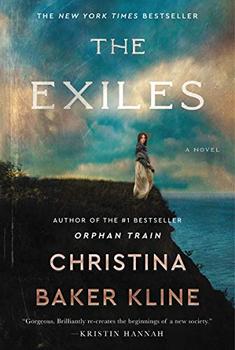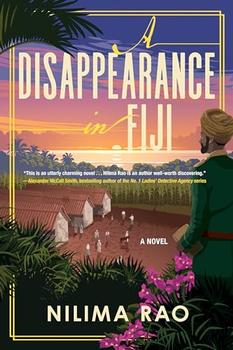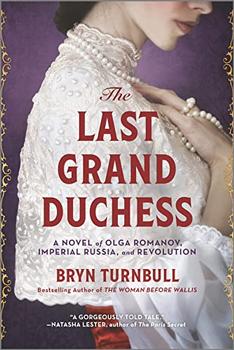Summary | Excerpt | Reading Guide | Discuss | Reviews | Beyond the book | Read-Alikes | Genres & Themes | Author Bio

A young governess finds herself pregnant and in prison for theft and attempted murder. An Irish thief and herbalist finds her medical skills in high demand on a convict ship bound for Australia. A young Aboriginal girl is placed in the home of a British family where she is meant to become "civilized." The Exiles brings these three women together under bleak circumstances, and each must discover what she's willing to do to survive in Christina Baker Kline's novel of adversity and resilience.
The narrative is shared between Evangeline, Hazel and Mathinna, with each telling a different part of a larger story in a linear fashion — each character picks up where the last left off. When the narratives do overlap, it's only briefly and not until much later in the book. The characters' circumstances naturally lend themselves to this sort of narration; while Evangeline and Hazel are together on the convict ship, Mathinna is far away in Australia with her own story to tell.
Kline uses the three points of view to highlight the drastically different treatment of the three women at the hands of the British government. Evangeline, despite being a convict and an unwed soon-to-be mother, is educated and formerly of the middle class, so while she is still treated as a prisoner, she is often given special attention and preferential treatment by those in charge. Hazel, a thief of no social standing, is seen as a true criminal and is often treated cruelly or abusively by others. But once she proves her knowledge and skills as a midwife, she begins to earn respect and trust. Mathinna, despite being the daughter of a former chieftain, is seen as a savage by the British settlers. She is intelligent and curious, but considered uncivilized because she is Aboriginal. The implied importance of education is indicative of the classist and racist beliefs of British imperialist culture. Anyone who is not educated in their narrow sense of the word is deemed inferior.
The treatment of Evangeline, Hazel and Mathinna demonstrate that Britain's power in the 19th century was sustained by the colonization and destruction of other peoples and cultures. Kline shares a little-known piece of history through Mathinna's story, as she is based on a real person (see Beyond the Book), but she is also a representative of all the children lost to their families and their tribes at the hands of the British.
Although many are familiar with the British establishing a penal colony in Australia, few are likely as familiar with the stories of women sent there to serve out their prison sentences. The descriptions of Newgate Prison, the convict ship and the convict stations in Van Diemen's Land — now known as Tasmania — bring the harsh realities of these women's lives to light. The atmosphere of oppression, selfishness and sadness makes the narrative more realistic, and also more tragic. Kline isn't afraid to write unhappy endings for her characters, which adds an additional layer of authenticity, as many of the women convicts ended up leading sad lives even if they managed to survive.
Because the overall nature of the story is bleak, the small moments of hope and joy shine all the brighter. Despite their stories only just overlapping, the three women each learn about the importance of inner strength and carrying on, whatever the circumstances: the past is always carried within you like the rings of a tree, and both the good and the bad make you stronger. It's a surprisingly positive outlook, one with which the main characters find varying degrees of success. However, perhaps it's reflective of the attitude of many of the real-life women convicts upon their release as they learned to make the best out of any situation and move on. In fact, reality shares a similar outlook: many modern-day Australians take pride in their ancestors. No matter what these individuals may have done to become convicts, they also helped found and develop a prosperous country. As the story follows Hazel into her life of freedom, her inner strength comes to serve her time and again as, like the women convicts after whom she's modeled, she helps make her new home a better place.
The Exiles can't be described as a happy story, but it is inspiring and thought-provoking. Exploring historical events that may be unknown to some readers, Kline offers a unique look at the treatment of those outside of the strict rules and regulations of 19th-century British society. Furthermore, the three points of view tell three distinct stories that intertwine to create a larger picture of friendship, survival and hope. It's a fascinating tale that will appeal to readers with a taste for well-researched historical fiction and female friendships that can't be broken.
![]() This review was originally published in The BookBrowse Review in October 2020, and has been updated for the
June 2021 edition.
Click here to go to this issue.
This review was originally published in The BookBrowse Review in October 2020, and has been updated for the
June 2021 edition.
Click here to go to this issue.

If you liked The Exiles, try these:

by Nilima Rao
Published 2024
A charming and atmospheric debut mystery featuring a 25-year-old Indian police sergeant investigating a missing persons case in colonial Fiji

by Bryn Turnbull
Published 2022
This sweeping novel takes readers behind palace walls to see the end of Imperial Russia through the eyes of Olga Nikolaevna Romanov, the first daughter of the last tsar.




At times, our own light goes out, and is rekindled by a spark from another person.
Click Here to find out who said this, as well as discovering other famous literary quotes!
Your guide toexceptional books
BookBrowse seeks out and recommends the best in contemporary fiction and nonfiction—books that not only engage and entertain but also deepen our understanding of ourselves and the world around us.